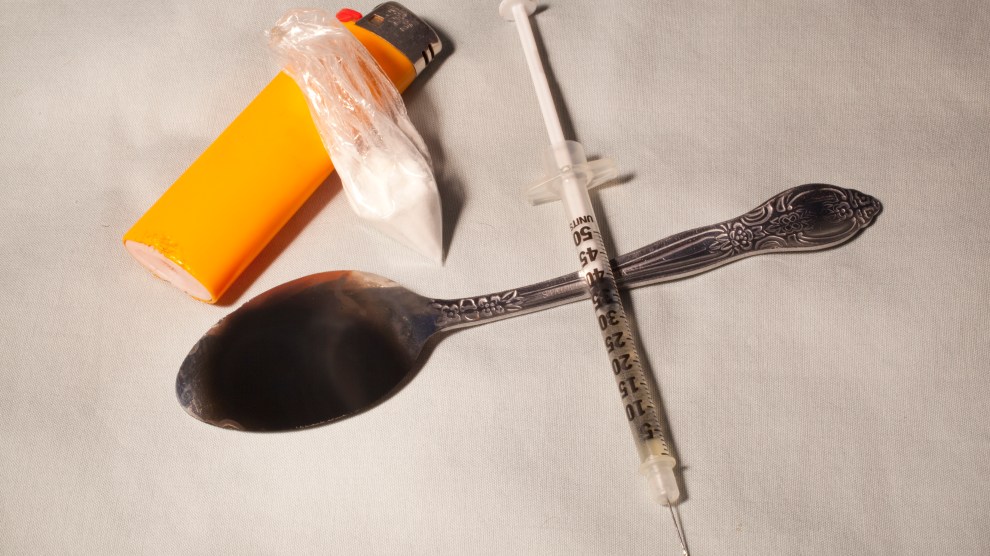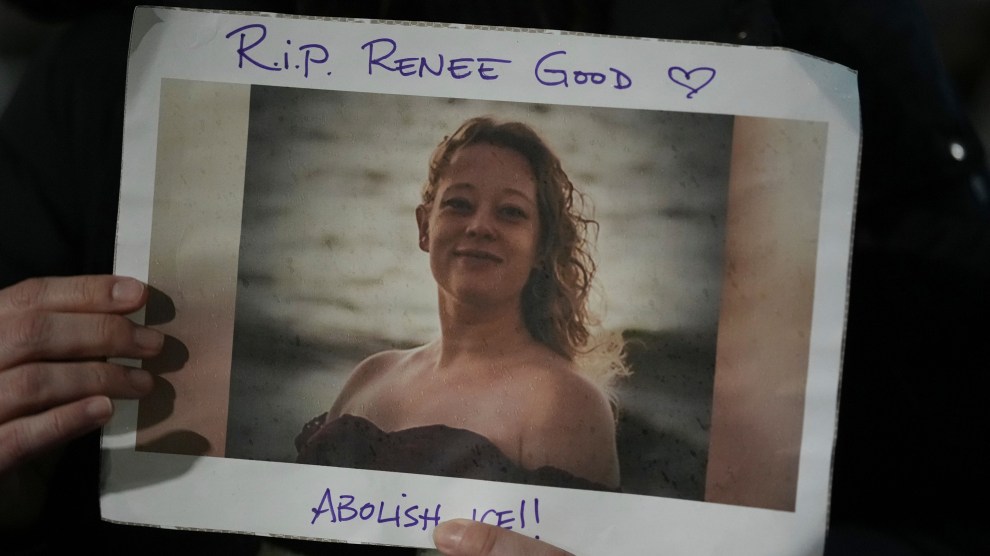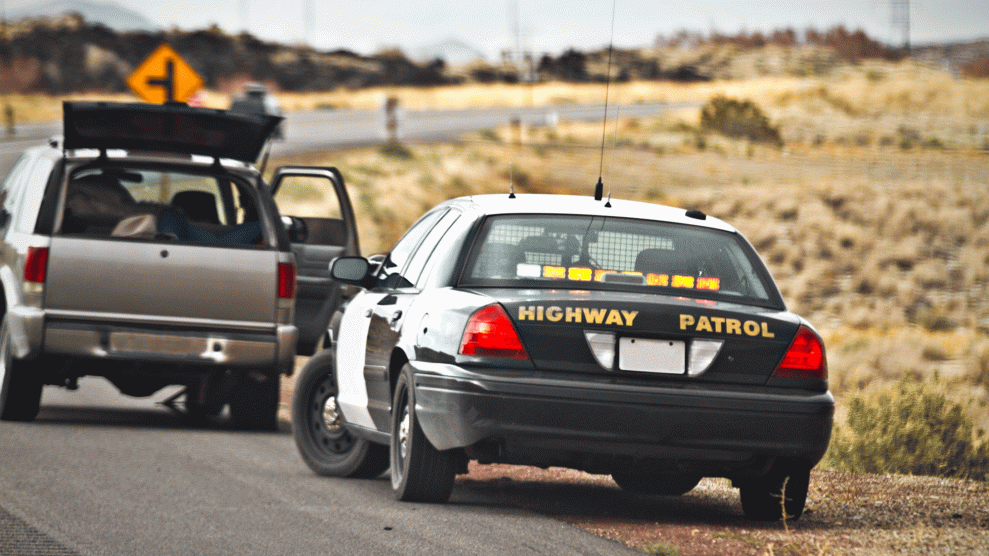
MCCAIG/Getty Images
We’re sitting in the middle of the highway looking for drug mules. Specifically, we’re at mile marker 174 of Interstate 80, which I learn is the interstate with the third most drug traffic in the country, and I’m in a highway patrol car next to a garrulous sergeant who has a square face and close-cropped blond hair and alternates between wads of chewing tobacco and sips of an energy drink. His eyes dart from car to car—sedans and SUVs and big rigs—looking for what, exactly, is hard to tell.
Beyond the shallow embankment on either side of the road are forests and farms and vineyards of northeast Ohio, and beyond that, the drug hubs of Detroit and Cleveland and Buffalo and New York City. “As I tell my guys, there’s bulk loads going by us multiple times a shift every day,” the sergeant says, eyes still on the cars. “Our job is to interdict drugs before they get to our community.” Or, as he puts it later: “I gotta go and hunt criminals.”
Ohio has one of the most robust highway drug seizure programs in the country, with 13,300 drug-related arrests last year—or about one every 90 minutes. In 2016, troopers seized 167 pounds of heroin—the equivalent to about 2 million doses on the streets—and 64,708 opiate pills. “Our approach is to stop a lot of cars,” says Lieutenant Robert Sellers, the public affairs commander for the highway patrol. “What we don’t want our troopers to do is walk away. We want to make sure that whatever they thought wasn’t right is right.”
The sergeant’s job is, in the split second that cars pass by, to look for telltale signs of drug couriers. It’s typical for people to see the patrol car, slow down, and then speed back up once they’ve passed him—those are the people he’s not interested in. He’s not interested in people speeding, or the drivers who look confident and relaxed. He is interested in rental cars, overly cautious drivers who stay below the speed limit, people who look in their rearview mirrors at him as they pass by, cars with tinted windows, drivers who look like they’re scrambling to move or adjust something as they pass, cars with recent fingerprints on the trunk. Cars that move into the right lane or that are closely tailing another are also red flags—they’re trying to distance themselves from the patrol car and blend into their surroundings, says the sergeant. Ultimately, a lot of the job is based on gut instinct: After years of watching thousands of cars go by, “your intuition will tell you when something’s wrong,” says Sellers.
Comments like this make me uneasy: The operation seems like a perfect recipe for profiling. The sergeant makes clear that race is not something that goes into his calculation of red flags—as he says later, “If you do this job based on stopping a certain race or age group or gender, you’re not gonna succeed.” But I cringe a little when, as we pull over the one car that we’ll pull over that afternoon—a sedan that had been closely tailing another car, in the far right lane, with recent fingerprints on an otherwise dirty trunk—the window opens to reveal a black man. (The sergeant lets him go with a warning.)
“Our professional operations policy forbids bias-based policing,” said Sellers. The troopers go through annual implicit bias training as part of their continuing education, he added, and each month, supervisors check the arrest data of their troopers to gauge for abnormally high arrest rates by race. According to highway patrol data online, 14.4 percent of drivers during all Ohio highway patrol stops were black. African Americans make up 12.7 percent of the state’s population.
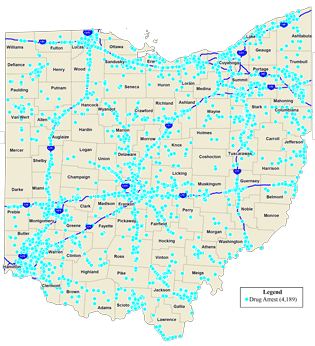
If a car catches the sergeant’s eye, he’ll turn onto the road and floor it so he can get a better view. Are the people moving around in the back just toddlers? Did the car speed up after all? If, after this, he’s still interested, then he pulls them over, typically for a minor violation like going over the lane marker or tailing another car. He maintains his friendly demeanor as he talks to drivers through their windows, but he’s also looking for clues: Nervous, sweaty drivers, pill bottles—especially in a different name than the driver’s—the scent of marijuana, recent receipts from a different place than the driver says he or she has been. And if anything looks suspicious, a German shepherd hops out of a squad car to sniff around. The dogs, who live with their handlers when they’re not on duty, are trained to look at or scratch around the area where they smell drugs. The sergeant tells me the story of a recent seizure, when a driver insisted there weren’t drugs in the car, and yet the dog kept calmly staring at the rooftop carrier—where the troopers later found 14 pounds of marijuana.
The day I’m there, troopers in the area use the tactic to find a car with a bucket full of marijuana, and another with two quarts of marijuana Kool-Aid, which I didn’t know was a thing, even as a Californian. The day before, there was a couple in a 2016 Nissan Ultima with more than 200 OxyCodone pills. The state highway patrol website features a strangely captivating running tab of the seizures, complete with photos of drugs in trunks or duct tape packages. There’s also a regularly updated map of drug busts, with a web of tiny blue dots for each seizure.
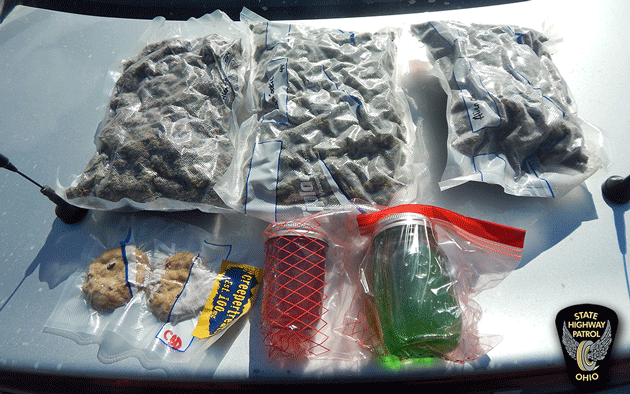
Unlike so many tight-lipped cops who make the news, the sergeant is eager to show me his work, and rattles on about recent busts, complete with details of the weight and the type of drug and where in the car it was. He’s seen what drugs can do to families—he was adopted because of his mother’s substance abuse—and he gushes about his daughters, 15 and 20. A few years ago, he says, “I decided I needed a hobby—all I did was eat, sleep, and breathe drugs.” When I ask him what the hobby is, a sheepish grin crosses his face as he mumbles, “fish.” I assumed this meant he liked fishing, but no—he has 16 aquariums with all sorts of exotic fish at his house. After a long day, he’ll sit in the aquarium room—where it’s quiet and things move slowly and there is no addiction or violence—and just watch.
I like the sergeant, yet I can’t stifle the questions that keep popping up in my head as we’re sitting there, looking for criminals. In addition to the profiling concern, there’s the question of efficacy: Are the troopers finding drugs just because they’re making so many stops and drugs are so prevalent, or are they finding drugs because they’re focusing on the right cars? Which is to say, is this even working?
The sergeant says he doesn’t think much about that higher-level question—as he put it, “I’ve got one goal in mind: If they’ve got drugs, to get their drugs.” Sellers admits that efficacy is hard to prove, but he says, “We do know we’ve had an impact.” He notes the heroin seized last year: “That’s 2 million doses of heroin that we took off Ohio roads that were destined for Ohio communities.”
And finally, there’s the concern about the casual nature with which troopers arrest and imprison. When he describes a trooper with a particularly high seizure rate whom we’re about to visit, the sergeant simply says, “He’ll probably have someone in handcuffs by the time we get there. He’s that good.” Indeed, he does—when we arrive a half hour later, the trooper has pulled over the car with four pounds of marijuana in a bucket. The troopers playfully compete with each other—as we’re leaving, the sergeant says, “Now we have to find five.” The sergeant routinely calls the drug couriers “bad guys,” as in “the bad guy is in the sergeant’s car.”
I press him on this “bad guys” thing—aren’t some of these folks just desperate people in desperate situations? His face softens and he begins to tell me about an arrest a few weeks ago—a man and young pregnant woman, who voluntarily produced a bag of marijuana and 10 Xanax pills. But watching the video of the couple in the back of the patrol car, the troopers noticed that the woman kept sticking her hands down her pants, adjusting something. When confronted about it, she tearfully reached into her vagina and pulled out a condom full of hundreds of pills. The sergeant shakes his head recalling this. “I would love to see her show up for court looking good, have her act together. But unfortunately, those kinds of endings don’t happen that often.”

